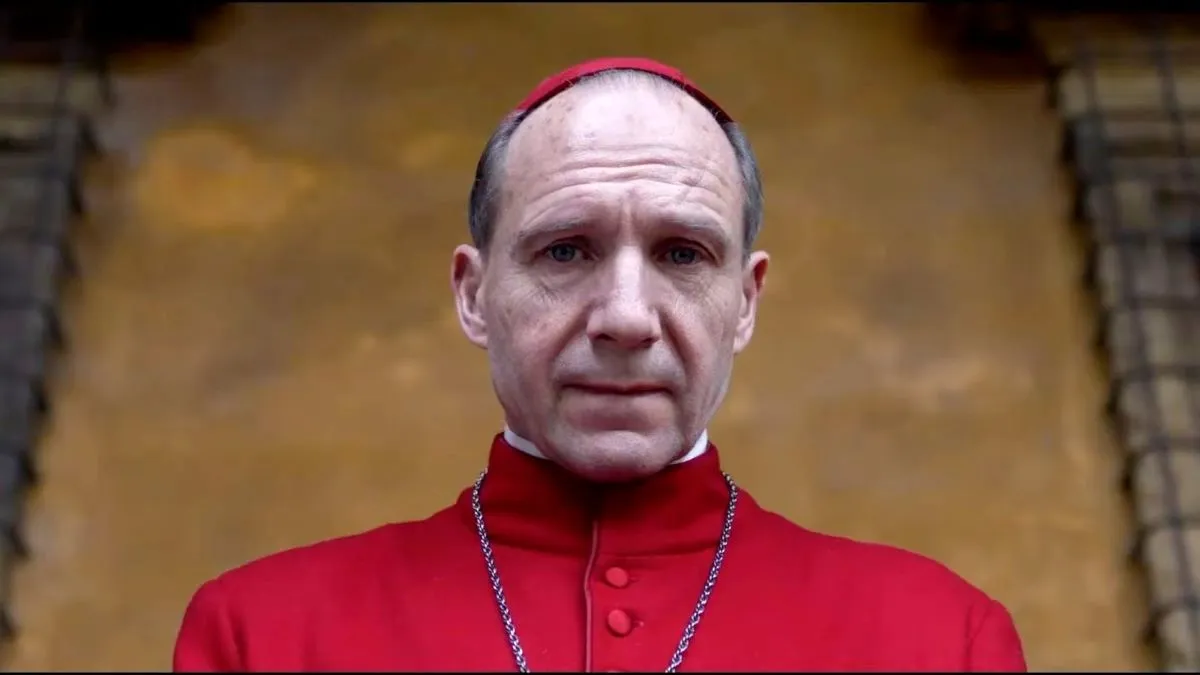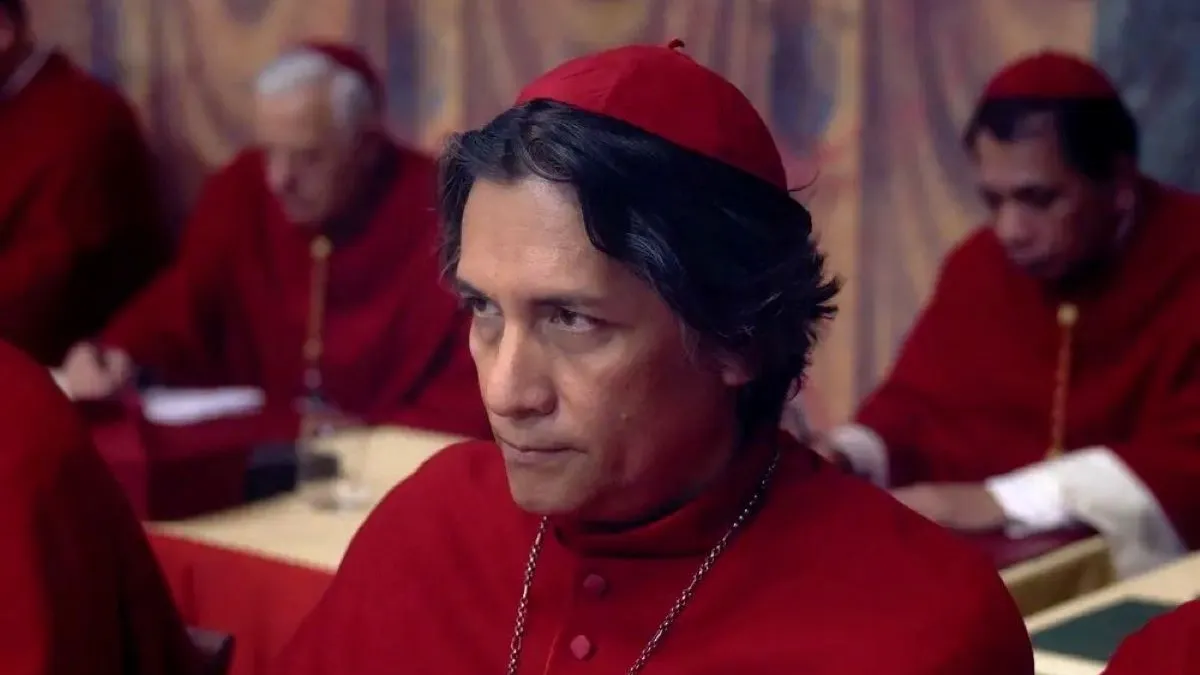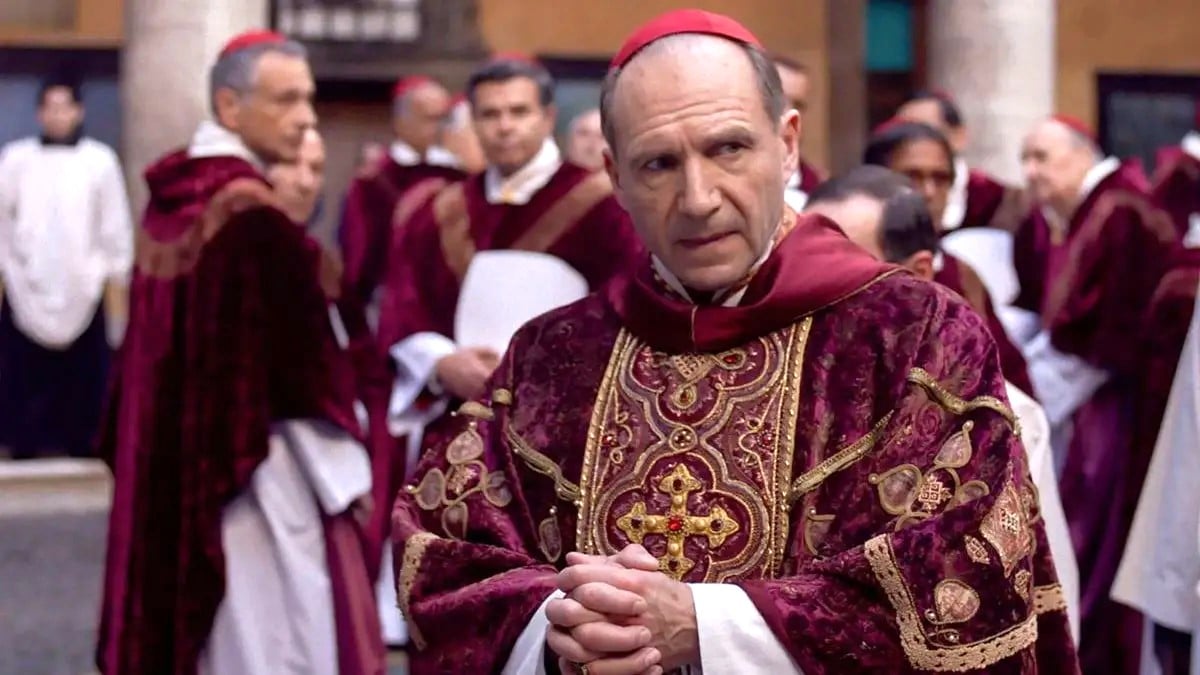Conclave is a film that, if you’re only just hearing about it now, appears to be a rather tough nut to crack. Buried deep within the backdrop of the Catholic Church and all the histories, traditions, and nuances that it implies, it will be no great surprise if Conclave stays relatively sleepy at the box office on account of its thoroughly academic set dressing.
But “set dressing” is the key word there, because the value of Edward Berger’s festival darling hinges not on knowing ones hymns from their sins, but on the viewer’s emotional grace and humility in the face of increasingly challenging circumstances; a capacity that the Church itself would do well to measure itself by. Indeed, Conclave believes that its viewers can rise to that emotional occasion, and this attitude quickly becomes the driving force of this deeply empathetic, firmly confident, and quietly exciting success, with a simmering trio of performances at the center of it all.
Conclave stars Ralph Fiennes as Thomas Lawrence, a British Cardinal-Dean who becomes tasked with organizing a papal conclave in order to elect a new pope following the incumbent Holy Father’s sudden death from a heart attack, despite Lawrence having attempted to resign not long before the pope’s death. Sequestered from the rest of the world so as not to cause a stir amongst the public, cardinals from around the world gather in Rome for the election.
Candidates include Lawrence himself, as well as his fellow liberal Aldo Bellini (Stanley Tucci), Canadian conservative Joseph Tremblay (John Lithgow), Italian traditionalist Goffredo Tedesco (Sergio Castellitto), Nigerian social conservative/economic progressive Joshua Adeyemi (Lucian Msamati), and Vincent Benitez (Carlos Diehz), a Mexican-born, Afghanistan-based archbishop who was secretly made so by the pope shortly before his death. As ideologies clash and skeletons are flung from closets, Lawrence takes it upon himself to manage whatever secrets he can find in hopes that the next pope won’t be someone who turns back years, if not decades, of the Catholic Church’s progress.

Key to the organism of Conclave is how it engages one’s emotional attention rather than intellectual attention. This isn’t to say that the writing itself isn’t intelligent; in fact, Peter Straughan’s screenplay captures both a daring ensemble of sentiments and a nimble narrative choreography that makes every revelation more satisfying than the last. Such is key to great mystery writing.
What that is to say, however, is that, because the writing is intelligent, some viewers may feel compelled to give all of their attention to every single plot detail woven into the film’s dynamics and dialogue. This is not what Conclave encourages. It wants you to watch with your body rather than your mind; pay attention to how quietly the plot carries itself, and contrast that with Volker Bertelmann’s sharp, evocative score that’s reminiscent of the film’s more impassioned moments, where the heft is in the power of the ideas presented rather than how they contribute to Conclave‘s mystery.
“Impassioned” is an apt description for the trio of Fiennes, Tucci, and Diehz as well, all three of whom provide deep pivots around which Conclave is capable of ticking the way it does. Fiennes captures a man who, at the moment, is at war with two sides of his humanity; his natural compassion and the unnatural parameters of the conclave and the Church as a whole. He’s quick to admit imperfection, slower to admit fallibility, and all-but determined to keep his nose pointed towards an ideal that’s meant to define the Church, but defines far too few of its members for it to stay afloat most anywhere. It’s a weight that somehow peaks and valleys simultaneously as it teeters on Fiennes’ shoulders, and coupled with his monologue on faith and doubt as a necessary dichotomy, the actor soars here.
Tucci, for his part, fascinates as Bellini, upon whom the true foundation of Conclave‘s depth is built upon. Most of the other candidates mark themselves as villains pretty resolutely with their racism, homophobia, sexism, and religious xenophobia, all of which Bellini understandably has very little patience for (and we’re not talking casual-slur bigotry here; we’re talking “gay people need to be put in prison and then burn in hell” bigotry). Unfortunately, there is all-consuming righteousness in standing against such things, and Bellini is not immune to it. As a result, his own shortcomings are harbored ignorantly and meekly, and he demands a similar righteousness from his fellow liberals (namely, Lawrence). It all makes for a very fine and tender line that Tucci must walk; one of an earned but poisonous anger that has three or four different lids on it, half of which his character might not even be aware of. With his storied career as an omen, however, it’s a line that’s walked magnificently by Tucci.

And finally, there’s Diehz in his breakout role of Benitez. Where Bellini was the foundation, Benitez is the rocket pointed squarely at Conclave‘s ambitious destination, and the subtle bravery inherent to the character takes on a remarkable life in Diehz’s eyes, voice, and body language. Without giving anything anyway, Benitez invites us to consider a whirlwind of interconnected emotions and ideas reflected in both the Church and the wider world that it claims to serve, but that it’s also, importantly, separated from.
Lawrence, for instance, speaks of diversity, but he nevertheless belongs to a world that’s driven by fear; a fear that’s necessary for faith to do its work, but also one that’s largely succumbed to rather than leveraged in pursuit of that faith and hope. Many of Lawrence’s fellow cardinals wear that fear on their sleeves and chests, disguising it as bravado and unwavering belief in the Catholic ideal (whatever that may look like to them, up to and including Catholic superiority).
But then there’s Benitez, whose penchant for compassion comes directly from the fact that the world he so confidently walks in, is an unestablished one. He has no agenda to push, no familiarity with which he feels the need to decorate the world with for his own comfort; he’s interested in love and he leads by example.
And leading by example is precisely what Conclave does as well. Berger’s is a meticulously crafted, movingly acted masterpiece whose exciting political chess match comes second only to the web of human behavior it wishes to demystify; a decidedly commendable, entertaining endeavor, and a far finer result.











Published: Oct 28, 2024 06:29 am